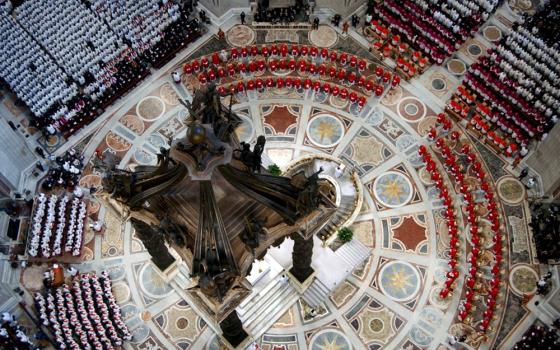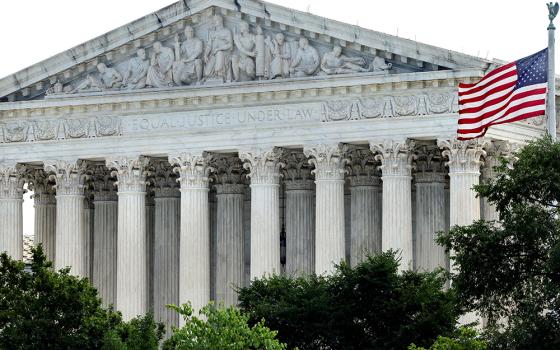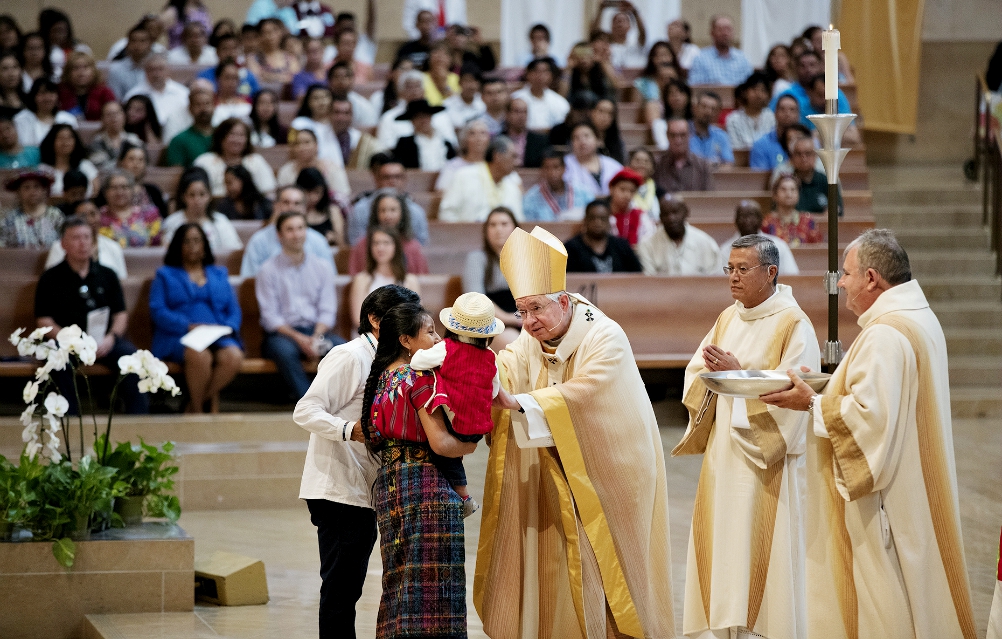
Archbishop José Gomez blesses a Mayan family from Guatemala during the presentation of the gifts at a June 18 Mass celebrated in recognition of all immigrants at the Cathedral of Our Lady of the Angels in Los Angeles. (CNS/Angelus News/Victor Aleman)
Last week, I wrote a column arguing that it is impossible to prove by looking at their press releases that the U.S. bishops are only concerned about abortion, gay marriage, and religious freedom and not about issues of justice and peace.
The last seven months of press releases from the U.S. Conference of Catholic Bishops include more releases devoted to immigration and health care for the poor than those on abortion and religious freedom.
A review of these releases also found that the rhetoric in the press releases on abortion and gay marriage is relatively mild, while the releases devoted to immigration, refugees and health care are passionate. While the language surrounding environmental issues is rather mild, on most issues dealing with the poor, the bishops have been very strong in the last seven months.
True, the rhetoric on religious freedom has also been strong, but the image of the bishops as only being interested in the culture wars is not supported by an examination of the press releases coming out of the bishops' conference.
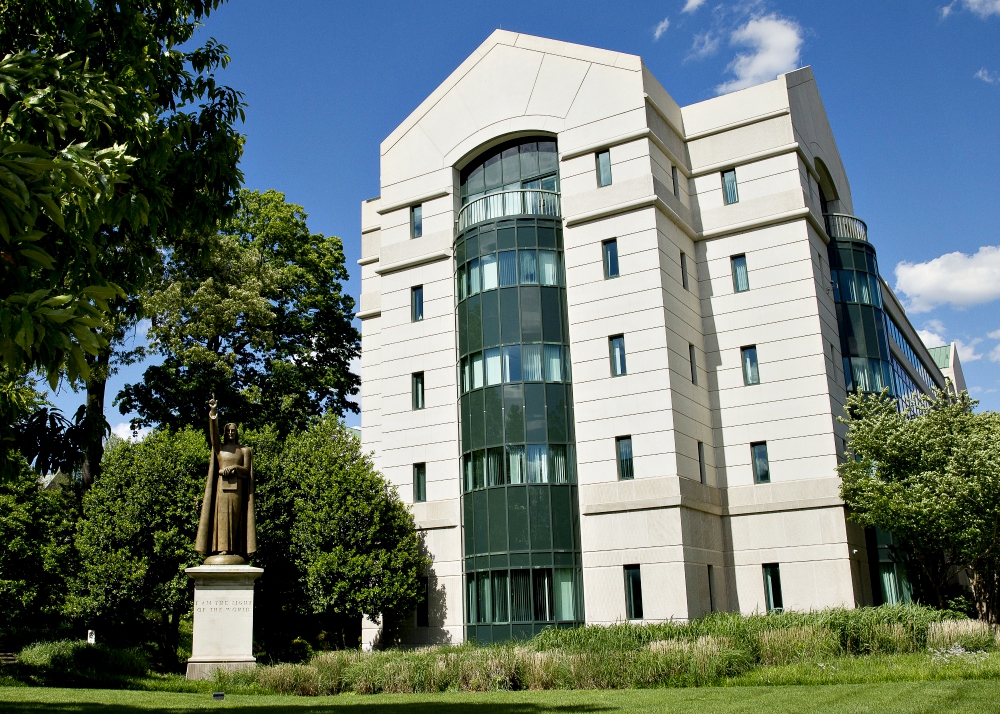
The U.S. Conference of Catholic Bishops building in Washington, D.C. (CNS/Tyler Orsburn)
One explanation for the tone of the releases is that the bishops can now afford to be milder on the culture war since a Republican administration is on their side, while the administration is totally against their concerns on immigration, refugees, and health care for the poor.
Steve Krueger of Catholic Democrats examined earlier press releases (1997-2000 and 2009-12) and found an increased focus on abortion, religious freedom and gay marriage during the first term of the Obama administration. Perhaps the nature and tone of conference press releases change with the political environment. In dealing with an administration, the bishops' rhetoric may get more passionate on the issues where there is disagreement.
One aspect of the press releases in the last seven months did show a bias toward the culture wars, and that was the higher rank of the prelates cited in releases devoted to abortion, gay marriage and religious freedom as compared to other issues. In the past, Cardinals Roger Mahony and Theodore McCarrick could be counted on to take up the banner of the poor, but today they are retired and no other cardinal has stepped into their shoes for the bishops' conference. Cardinals Blase Cupich and Joseph Tobin may speak on their own but not for the conference.
The media gives more coverage to bishops when they speak on abortion, gay marriage and religious freedom than when they speak on other issues. Individual bishops who speak with passion on cultural issues get lots of attention, especially if they exclude people from Communion or say that a good Catholic cannot vote for someone who is pro-choice.
More than a few bishops have taken these positions. According to Krueger, during the 2004 election, 15 bishops said they would deny John Kerry Communion. In 2008, 57 bishops said that abortion was the most important issue in the election. The spring after the election, 82 bishops complained about the University of Notre Dame giving President Barack Obama an honorary degree or having him as a commencement speaker. Fifty-four bishops also signed on to the Manhattan Declaration, a religious manifesto sponsored by evangelical and Catholic conservatives associated with the Republican Party.
And don't forget the Fortnight for Freedom, which placed religious liberty (in opposition to the Obama administration) as a central issue in the 2012 presidential campaign.
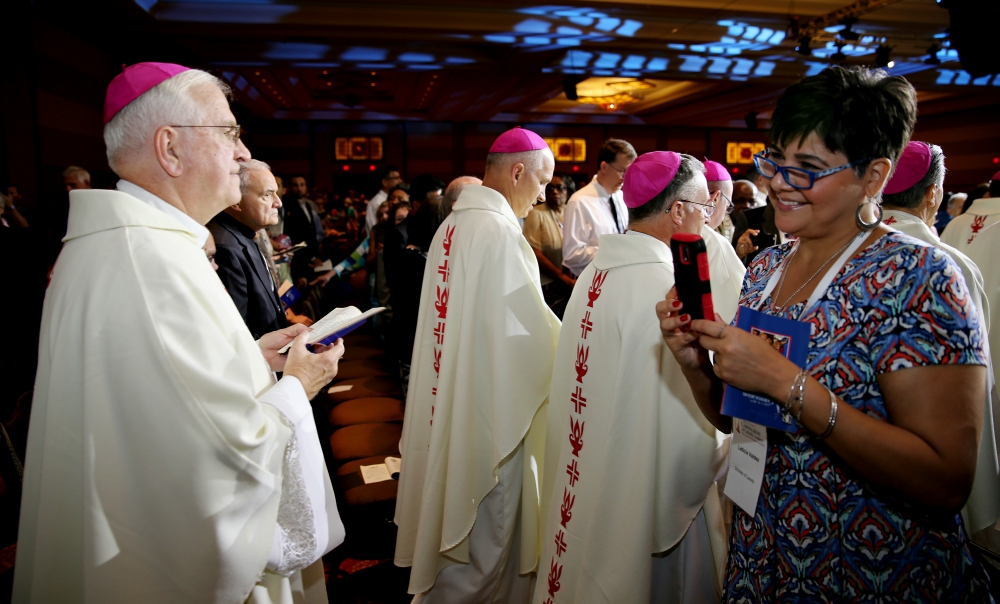
Archbishop Joseph Kurtz of Louisville, Ky., former president of the U.S. Conference of Catholic Bishops, processes with other prelates during a Fortnight for Freedom Mass July 3 in Orlando, Florida. (CNS/Bob Roller)
Krueger argues that by 2012, 54 percent "of active bishops had made public statements or taken public actions that communicated that you cannot be a good Catholic if you vote for the Democratic candidate."
These bishops are often seen by media and the public as representative of all the bishops. The public's view is reinforced by the fact that other bishops rarely challenge their colleagues in public. While moderate bishops may think that keeping silent during a political campaign is the right thing to do, the public interprets this silence as support for the conservative bishops who do speak out. Silence is consent.
No bishop wants to appear as defending, let alone endorsing, a pro-choice candidate, so they remain silent. Only Pope Francis could get away with saying that the church should not obsess over abortion, birth control and gay marriage. If a simple bishop had said this, he would have been shunned by his fellow bishops.
But press releases are not the only way that the bishops show their political priorities. The Fortnight for Freedom, lobbying on Capitol Hill, and litigation in the courts also show where the bishops put their priorities. Episcopal litigation and the Fortnight for Freedom were aimed at countering Obama administration programs.
While the bishops do lobby on many issues, it was noteworthy that the bishops were willing to see the Affordable Care Act go down to defeat in 2010 because it did not have the language they wanted on abortion and birth control. On the other hand, the Catholic Health Association and the Leadership Conference of Women Religious felt the language was satisfactory and therefore supported the legislation because it would expand health care for the poor.
Advertisement
Interestingly, more recently, the bishops were willing to see the Republican health care bills, with their language against abortion, go down to defeat because of their impact on poor people. Now that Obamacare is the law of the land, the bishops have adopted the position of the Catholic Health Association and LCWR. Returning to the health care world before Obamacare is unacceptable. Republican repeal and replace is unacceptable if the poor are denied the coverage they now receive from the expansion of Medicaid and health care subsidies.
In other words, at least for now in the debate over the Republican bills, health care for the poor trumps abortion for the U.S. bishops. Few in the media, and few bishops, have acknowledged this change in political tactics by the U.S. bishops.
One of the truisms of media theory is that once you get a reputation, once you are pigeonholed, it is difficult to change your image in the media. Francis is a true master of rebranding, but the U.S. bishops are too divided to get their act together and present a pastoral, inclusive and compassionate face to the public, let alone to the media.
To rebrand the bishops, it will take words and actions. The equivalent of a fortnight for the environment or immigration or economic justice might help, and/or a march on Washington for the same issues. It would also require putting cardinals out front in calling for policies to help the poor.
Finally, the bishops should remember that the high point of their positive media coverage came decades ago during their work on the pastoral letters on peace (1983) and the economy (1986). But the honest truth is that the main reason the media noticed the peace pastoral was that the Reagan White House made the mistake of attacking the bishops just before they met in Washington to discuss it.
This leads me to think that the best way for the bishops to rebrand themselves is to get attacked in a presidential tweet. But that presumes they want to be rebranded.
[Jesuit Fr. Thomas Reese is a columnist for NCR and author of Inside the Vatican: The Politics and Organization of the Catholic Church.]
Editor's note: Sign up to receive emails, and we will notify you when new Faith and Justice columns are out.






